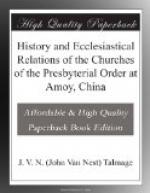So much for the Report of the Committee of Synod. The decision of Synod has been given, as stated above. The important question now is, what will be the result of this decision on the Church at Amoy? This question, however, cannot yet be answered with certainty, for we cannot yet even guess what course the Missionaries there, when they learn the decision of Synod, will feel it their duty to pursue. There may be more, but I can now only think of three ways open before them. (1.) To ask the Board to recall them. They firmly believe that their course of proceeding, in organizing the Church at Amoy, is not only in accordance with the teachings of the Holy Scriptures, but also with the principles of our Church. To be the instruments, then, of dividing the Church, which God has gathered by their hands, may be to sin against their consciences. They may therefore ask the Board to appoint other agents to carry out the decision of Synod. This would not be insubordination, but perfect subordination both to the authority of Synod and also to that authority which all Protestant Christians acknowledge to be supreme. This, I suppose, would be the most natural course for the brethren to take, except for one consideration; that is, their love for the Churches gathered by them, or under their care, and their responsibility in reference to the spiritual welfare of those disciples of the Lord. It would be the severest trial they have ever been called on to endure to be recalled from their work. Therefore (2.) They may delay their action, making one more effort to get their views published, hoping that the Church will yet change her decision, and not require of them to engage in a proceeding which they think will be so injurious to the cause of Christ; but, on the contrary, will approve of the course heretofore adopted by them as altogether scriptural, and the true doctrine of our Church. Or (3.) They may possibly, after mature reflection, think the least evil will be to carry out the decision of Synod, although that decision be altogether contrary to their own judgment. Then they will take three of the six churches, which now are all of our order, and organize these three a separate Denomination and an integral part of the Church in America. This is the course which at home will be generally expected of them.
Now let us suppose that they will adopt this third course, and then let us look calmly at its results—at the supposed or real advantages thereof, and the supposed or real evils thereof.
We first look at the Advantages.




